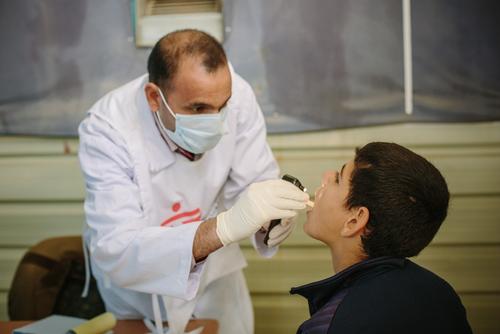Baghdad, Geneva – Thousands of people fleeing violence in Iraq are in desperate need of food, water, shelter, and medical care, even after arriving in areas of the country accessible to aid organizations Médecins Sans Frontières (MSF) warned today.
Over 180,000 displaced people have taken refuge in Kirkuk, a multi-ethnic city near the front lines of the conflict, with new arrivals continuing to stream in. Many people are staying in substandard, overcrowded shelters and suffering from ailments including urinary and chest infections, skin diseases, and anaemia, due in part to a lack of food and water. MSF is the only international medical organization providing services in the area and is calling for immediate international assistance in Kirkuk and other areas where displaced and vulnerable people can be reached.
"In spite of security challenges in Kirkuk, it is still possible for aid organizations to work in the city," said Fabio Forgione, MSF head of mission. "But we see too little international assistance; most aid comes from local organizations and is largely insufficient. We need international aid organizations to step up their efforts wherever possible."
More than two million Iraqis have fled their homes due to armed conflict this year. Many remain in areas that are directly affected by violence and cut off from humanitarian assistance. Yet those who reach safer areas are largely neglected. Local governments and host communities are struggling to respond to the emergency.
"When I came to Kirkuk I felt safer, and now I can sleep," said a woman who fled bombings in Beiji and is living with her family in an unfinished building in Kirkuk. "But no one came to us except for the governor (of Kirkuk) and the Red Crescent. We didn't see anyone else. We made requests, asking mattresses, stoves, oil, carpets. No one gave us anything."
So far the international response has focused mainly on Iraqi Kurdistan, where several camps for displaced people have been prepared. Most of the funds made available by international donors have been directed to this region and not to other accessible areas such as Kirkuk.
"Poor living conditions and overcrowding have a direct impact on people's health," said Forgione. "After fleeing terrible violence, families need basic, humanitarian aid to ease the hardships of their displacement. It is incumbent on the international community to provide it."
MSF has worked in Kirkuk since 2010 and since July has rapidly increased its assistance to the displaced population, operating mobile clinics in six locations throughout the city, focusing on chronic disease and maternal and pediatric care. Since July, MSF teams provided 5.821 medical consultations. MSF is also distributing 25,000 blankets and more than 3,700 kits with hygiene items to displaced families in Kirkuk.



